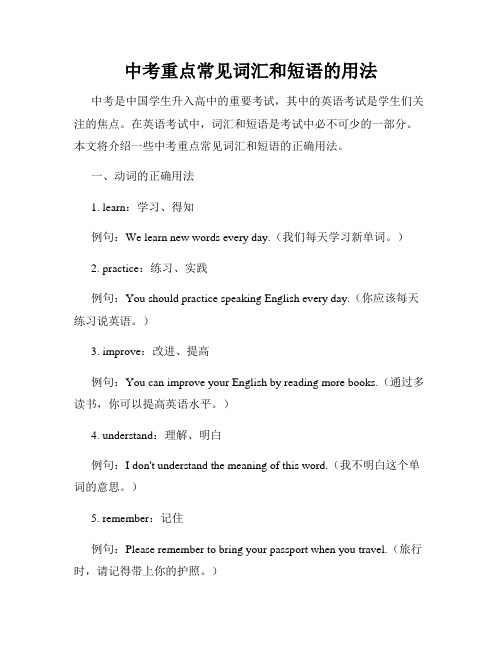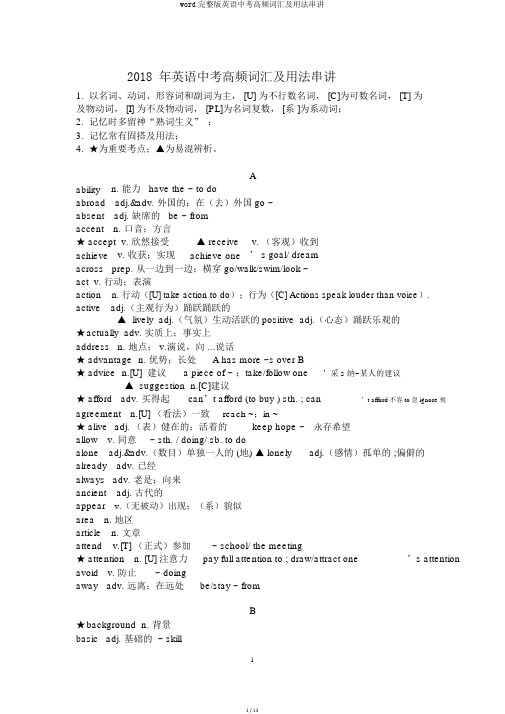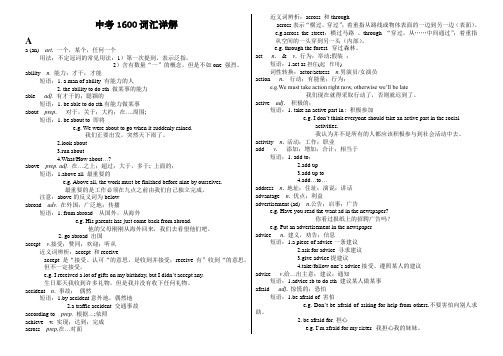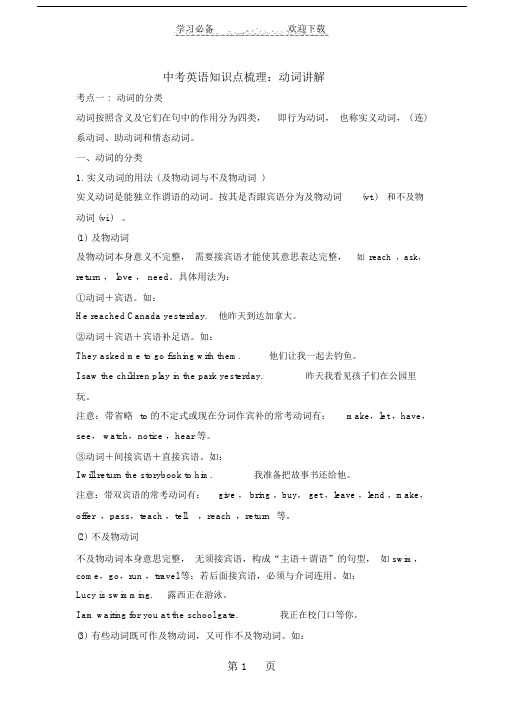中考英语考纲词汇用法详解.doc
中考英语词汇大纲

中考英语词汇大纲一、名词(n.)1. ability [əˈbɪləti] n. 能力;才能。
2. absent [ˈæbsənt] adj. 缺席;不在(其名词形式为absence [ˈæbsəns],n. 缺席;不在)3. accident [ˈæksɪdənt] n. 事故;意外的事。
4. action [ˈækʃn] n. 行动;行为;动作。
5. activity [ækˈtɪvəti] n. 活动。
二、动词(v.)1. accept [əkˈsept] v. 接受。
2. achieve [əˈtʃiːv] v. 达到;完成;成功。
3. act [ækt] v. 行动;表演;扮演。
4. add [æd] v. 添加;增加;补充说。
5. address [əˈdres] v. 写地址;向……讲话(该词也可作名词,n. 地址)三、形容词(adj.)1. able [ˈeɪbl] adj. 能够;有能力的。
2. active [ˈæktɪv] adj. 积极的;活跃的。
3. afraid [əˈfreɪd] adj. 害怕的;担心的。
4. alone [əˈləʊn] adj. 单独的;独自的(也可作副词,表示“单独地;独自地”)5. angry [ˈæŋgri] adj. 生气的;愤怒的。
四、副词(adv.)1. about [əˈbaʊt] adv. 大约;到处;四处(该词也可作介词,表示“关于;在……周围”)2. above [əˈbʌv] adv. 在(或向)上面;在(或向)较高处(该词也可作介词,表示“在……上面”)3. abroad [əˈbrɔːd] adv. 在国外;到国外。
4. actually [ˈæktʃuəli] adv. 实际上;事实上。
5. again [əˈgen] adv. 再一次;又一次。
2024年中考英语考纲词汇

考纲重点语法必背一、考纲重点语法总结(一)一.词类(Parts of Speech)名词英文名称The Noun(缩写为n.)表示人或事物的名称例词boy,clock,book等冠词英文名称The Article(缩写为art.)用在名词前帮助说明名词所指的人和或事物。
例词a(an),the代词英文名称The Pronoun(缩写为pron)用来代替名词、形容词或是数词例词we,that,his,what形容词英文名称The Adjective(缩写为adj.)用以修饰名词,表示人或事物的特征例词old,red,fine,good.数词英文名称The Numeral(缩写为num.)表示数量或是顺序。
例词one,thirteen first动词英文名称The Verb(缩写为v.)表示动作或状态。
例词sit,go,be(am,is,are)副词英文名称The Adverb(缩写为adv.)修饰动词、形容词或其他副词。
例词not too,here,very介词英文单词The Preposition(缩写为prep.)表示名词、代词等和句中其他词的关系。
例词in,on,of,to,under.连词英文单词The Conjunction(缩写为conj.)用来连接词与词、短语与短语或句与句。
例词and,or,but.感叹词英文单词The Interjection(缩写为interj.)表示说话时的喜悦、惊讶等情感。
例词oh,hello,hi,er.二.名词(Nouns)1.总的说来,名词分专有名词和普通名词两类。
专有名词:表示具体的人,事物,地点或机构的专有名称。
Lucy China中国Asia亚洲Beijing北京。
专有名词的第一个字母要大写。
普通名词:表示某些人,某类事物,某种物质或抽象概念的名称。
例如:teacher老师tea茶reform改革普通名词又可进一步分为四类1)个体名称:表示单个的人和事物。
中考重点常见词汇和短语的用法

中考重点常见词汇和短语的用法中考是中国学生升入高中的重要考试,其中的英语考试是学生们关注的焦点。
在英语考试中,词汇和短语是考试中必不可少的一部分。
本文将介绍一些中考重点常见词汇和短语的正确用法。
一、动词的正确用法1. learn:学习、得知例句:We learn new words every day.(我们每天学习新单词。
)2. practice:练习、实践例句:You should practice speaking English every day.(你应该每天练习说英语。
)3. improve:改进、提高例句:You can improve your English by reading more books.(通过多读书,你可以提高英语水平。
)4. understand:理解、明白例句:I don't understand the meaning of this word.(我不明白这个单词的意思。
)5. remember:记住例句:Please remember to bring your passport when you travel.(旅行时,请记得带上你的护照。
)二、名词的正确用法1. exam:考试例句:I have an English exam tomorrow.(我明天有一场英语考试。
)2. grade:年级、分数例句:He is in the fifth grade.(他在五年级。
)3. subject:科目例句:Math is my favorite subject.(数学是我最喜欢的科目。
)4. book:书例句:I borrowed a book from the library.(我从图书馆借了本书。
)5. knowledge:知识例句:Reading can broaden our knowledge.(阅读可以扩大我们的知识面。
)三、形容词和副词的正确用法1. difficult:困难的例句:This math problem is difficult to solve.(这个数学问题很难解。
word完整版英语中考高频词汇及用法串讲

2018 年英语中考高频词汇及用法串讲1.以名词、动词、形容词和副词为主, [U] 为不行数名词, [C]为可数名词, [T] 为及物动词, [I] 为不及物动词, [PL]为名词复数, [系 ]为系动词;2.记忆时多留神“熟词生义” ;3.记忆常有固搭及用法;4.★为重要考点;▲为易混辨析。
Aability n. 能力 have the ~ to doabroad adj.&adv. 外国的;在(去)外国go ~absent adj. 缺席的 be ~ fromaccent n. 口音;方言★ accept v. 欣然接受▲ receive v. (客观)收到achieve v. 收获;实现achieve one ’ s goal/ dreamacross prep. 从一边到一边;横穿go/walk/swim/look ~act v. 行动;表演action n. 行动([U] take action to do);行为([C] Actions speak louder than voice). active adj.(主观行为)踊跃踊跃的▲lively adj.(气氛)生动活跃的positive adj.(心态)踊跃乐观的★actually adv. 实质上;事实上address n. 地点; v.演说,向 ...说话★ advantage n. 优势;长处 A has more ~s over B★ advice n.[U] 建议 a piece of ~ ;take/follow one’采s纳~某人的建议▲suggestion n.[C]建议★ afford adv. 买得起can’t afford (to buy ) sth. ; can’t afford不容to忽ignore视agreement n.[U] (看法)一致reach ~;in ~★ alive adj. (表)健在的;活着的keep hope ~永存希望allow v. 同意~ sth. / doing/ sb. to doalone adj.&adv.(数目)单独一人的 (地) ▲ lonely adj.(感情)孤单的 ;偏僻的already adv. 已经always adv. 老是;向来ancient adj. 古代的appear v.(无被动)出现;(系)貌似area n. 地区article n. 文章attend v.[T] (正式)参加~ school/ the meeting★ attention n. [U] 注意力pay full attention to ; draw/attract one’s attention avoid v. 防止~ doingaway adv. 远离;在远处be/stay ~ fromB★background n. 背景basic adj. 基础的 ~ skill★business n. 买卖;事务(It ’s none of your business. / Mind your own business).★ besides adv. 并且(附带)▲except prep.&conj. 除...以外(没了;例外)★ beat v.敲击( ~ heavily against the window);赢(某人)▲ win v.赢竞赛 / 奖bill n. 账单;钞票blow v. 吹▲ blow – blew-blownboard n. 板子book n. 书; v. 预约born adj. 出生的was/ were ~ in / with 出生于 ... / 天生具备 ...★ borrow v. 借来 ~ sth. from sb. ▲lend v.借给 ;借出 ~ sth. to sb. = ~ sb. sth.bottom n. 底部at the ~ of 在...的底部; from the ~ of one ’ s heart从心底★ bring v.带来~ sb. sth. ▲take v. 带走;携带 ~ sb./sth. to sp.get v. 去取carry v. 搬运Ccall v. 呼喊;称作;打电话~ for 需要 ...;~ in 召来;叫来n.呼喊;电话联系;需要cancel v. 撤消capital n. 国都;大写★ care v.[I] 关怀 n. 关怀;当心~ about 在意; ~ for 照料; take good ~ of 好好照料★ cause n.原由( the cause of ...的原由); v. 惹起( cause sb. to do)certain adj. 某一;特定的▲ certainly adv. 自然chance n. 时机( have the ~ to do);可能性( have a good/zero ~ of doing)check v. 检查;查对▲ ~ out 核实;去看看choice n. 选择( have no choice but to do 别无选择只好做)★ close v. 封闭adj. (距离)近的;(关系)亲近的 ; adv. 近地 get ~ to ▲ closed adj.封闭着的closely adv. (联系 )亲近地 be ~ connected with... collect v. 采集;珍藏;召募~ moneycommunity n. 社区compare v. 比较(~ A with B 把 A 与 B 作比较; ~ A to B 把 A 比作 B)★ complete v. 达成;实现~ the task/ one ’s dreamdj. 完好的;完好的completely adv. 完好地★ condition n. 条件;状况( be in good/poor health condition )control n.&v. 控制( be in control of 掌管;管理)★cost n. 成本;花销;代价( at the cost of 以...为代价);v. 物花人钱cover n. 覆盖物;盖子; v. 覆盖;包含;波及circle n. 圆圈;圈子; v. 圈出★ consider v. 考虑( ~ doing);以为( sth. be considered as/to be);顾及( ~ others ’ feelings)continue v. 连续~ to do / doingconversation n. 谈话;发言cook v. 做饭n. 厨师copy v. 复制;抄录n. 一份;复制品 a ~ of newspaper★count v. 数数;很重要 coursen. 过程;课程;一道菜create v. 创建;创作(文艺作品)▲ invent v. 发明cry v. 哭;大叫culture n. 文化cultural adj. 文化的cute adj. 可爱的Ddance v. 跳舞n. 舞会deaf adj. 聋的;不肯听的★ deal n. 交易 a big ~ 重要的事v. 办理 ~ withdegree n. 程度;学位;度数dig v. 挖dig – dug-dug★ decision n. 决定( make a ~ to do)★describe v. 描绘★description n. 描绘development n. 发展(从无到有)★ difference n. 差别;不一样(make a ~ to doing对...产生巨大影响)direct v. 指导;导演;带路adj. 直接的;坦直的▲ director n. 导演direction n. 方向;导演;指导;指挥discovery n. 发现(本来存在之物)discussion n. 议论( have a ~ with)divide v. 区分( be divided into 被区分为 ...)double adj. 双倍的 v. 加倍;使加倍My scores doubled.★ doubt v. 思疑;不确立n. 思疑There’s no doubt that ... / without doubt draw v. 画画;拉;吸引draw – drew-drawndress n. 连衣裙 v. 给...穿衣~ oneself / get dressed / ~ up (as)drink v. 喝n. 饮料;酒drive v. 驾驶;驱遣 ~ sb. crazy 把某人逼疯drive – drove-driven n. 驾车旅行 two hours ’两~小时车程drop v. 落下;降低;减少;抛弃n. (水或许液体)滴 a ~ ofdry adj. 干燥的 v. 变干;晾干Eeducation n. 教育elder adj. (家庭成员)较长的~ sister 大姐else adj. 其余;其余的( What ~ did you do?)adv. 其余;不然empty adj. 空的;安闲的;空洞的▲v. 凌空end n. 最后部分;终端at the ~ of 在(时间 / 空间)末端by the ~ of 截止到(时间末)以前in the ~最后;终于v. 结束;终结~ the meeting / The meeting ended.enemy n.仇敌enter v. 进入;参加(竞赛;考试);开始从事;登记★ excuse n. 原由;借口do sth. without any ~v. 谅解;饶恕★ experience n. [C]经历; [U]经验; v. 经历explain v. 解说▲explanation n. 解说express v. 表达; n.快递★expression n. 表达(方式);短语;表情★even adv. 甚至;更加ever adv. 以前★especially adv. 特别(典型)★easily adv. 简单地;轻易地★exactly adv. 精准地;恰好;正好;确实是either adj.&pron. (二者中)任一个; adv. 也不(否认句中)Fface n. 面部v.[T]面对~ a challengefact n. 事实in ~ = as a matter of ~ 事实上★ fail v.[T]&[i] 失败 ~ (in) an exam ;~ to do 没能做成某事★ failure n. [U]失败; [C]一个失败的人或事( a ~)fair n. 展会;市集; adj. 公正的fall v. 摔倒;落下;减少n. 瀑布 fall –- fellfallenfan n. 电扇;粉丝far adv. 远地▲距离: farther - farthest 程度: further - furthest★fast adj.&adv. 迅速的(地);牢牢的(地)fear n. 惧怕 v. 惧怕feed v. 喂食品;饲养;以 ...为食▲fed - fed - fedfield n. 野外;体育场;领域fine adj. 好的;雅致的;明朗的n.&v. 罚款fire n. 火;热忱v. 开火;焚烧fit v. 适合;称身adj. 适合的foot n. 脚;英尺★ force adv. 逼迫(~ sb. to do); n. 武力;军队★ form n. 形式;表格( fill in a ~);v. 形成free adj. 自由的(set sth. ~);免费的 ;安闲的▲freely adv. 无拘束地(talk ~)fresh adj. 新鲜的;淡水的;无经验的~ ideafun n.[U] 乐趣;风趣的人或事What fun it is to dance!funny adj. 风趣的;搞笑的★ finally adv. 最后;终于Ggeneral adj. 大概的;全体的;广泛的n. 将军gift n. 礼品;天分giraffe n. 长颈鹿government n. 政府grammar n.语法★ grow v. [I] 生长;渐渐变得; [T] 栽种grow – grew- grownguard n. 警卫;保镖v. 看守★ guide v. 指引;指导( ~ sb. to do); n. 导游;导游Hhabit n. 习惯▲ hobby n. 喜好hang v. 悬挂~ out with sb. 和某人闲逛▲ hang - hung - hung★ honor n. 荣誉( in ~ of 为了纪念 ...);v. 给某人授与荣誉( sb. be honored to do 某人很有幸做某事)★ hard adj. 坚硬的;困难的;努力的~ work 努力工作(名词短语)adv. 努力地;严重地rain ~ 雨下得大; work ~ 努力工作(动副短语)★ hardly adv. 几乎不( can ~ do)★ harmful adj. 有害的be ~ to 对 ...有害hate v.&n. 仇恨;憎恶~ doing★ health n. [U] 健康~ problem 健康问题; be in good ~ (condition) 身体好★ healthy adj. 健康的keep ~★ hear v. 听到~ of/about 听闻; ~ from 收到某人的来信; hear-heard-heard heat n. 热(量)v. 加热high adj. 高的;高等的adv. 高地▲ highly adv. 高度地 think/speak ~ of height n. 高度It ’ s 2 meters in它~.两米高。
中考英语重点单词和短语用法大总结

中考英语重点单词和短语用法大总结1.单词用法:- remember:后接动词-ing形式,表示记得做过的事情;也可以后接不定式,表示记得需要做的事情。
例如:I remember seeing her yesterday. (记得昨天看到她。
)- believe:后接宾语从句,表示相信一些事实或观点。
例如:I believe that she is a good singer. (我相信她是一个好歌手。
)- like:可以用作动词、介词或连词。
作为动词时,它后面跟宾语;作为介词时,它后面跟名词、代词或动名词;作为连词时,它引导并列结构。
例如:I like apples. (我喜欢苹果。
)She looks like her mother. (她长得像她的妈妈。
)I like reading books and watching movies. (我喜欢读书和看电影。
)- need:后面可以跟动词原形,表示需要做事;也可以跟to do结构,表示需要做事。
例如:I need to go to the store. (我需要去商店。
)I need you to help me. (我需要你帮助我。
)2.短语用法:- be good at:表示擅长项技能或活动。
例如:She is good at playing the piano. (她擅长弹钢琴。
)- take care of:照顾,照看。
例如:Can you take care of my cat while I'm on vacation? (你能在我度假期间照顾我的猫吗?)- look forward to:期待,盼望。
例如:I'm looking forward to the summer vacation. (我期待着暑假。
)- get along with:与人相处融洽。
例如:I get along well with my classmates. (我与我的同学相处得很好。
中考英语1600词汇详解版.doc

中考1600词汇详解Aa (an) art. 一个,某个,任何一个用法:不定冠词的常见用法:1)第一次提到,表示泛指。
2)含有数量“一”的概念,但是不如one 强烈。
ability n.能力;才干;才能短语:1. a man of ability 有能力的人2. the ability to do sth 做某事的能力able adj.有才干的;聪颖的短语:1. be able to do sth有能力做某事about prep. 对于,关于;大约;在….周围;短语:1. be about to 即将e.g. We were about to go when it suddenly rained.我们正要出发,突然天下雨了。
2.look about3.run about4.What/How about…?above prep. adj.在…之上;超过;大于,多于; 上面的;短语:1.above all 最重要的e.g. Above all, the work must be finished before nine by ourselves.最重要的是工作必须在九点之前由我们自己独立完成。
注意:above的反义词为belowabroad adv. 在外国;广泛地;传播短语:1. from abroad 从国外,从海外e.g. His parents has just come back from abroad.他的父母刚刚从海外回来,我们去看望他们吧。
2. go abroad 出国accept v.接受;赞同;欢迎;听从近义词辨析:accept 和receiveaccept 是“接受、认可“的意思,是收到并接受;receive 有”收到“的意思,但不一定接受。
e.g. I received a lot of gifts on my birthday, but I didn’t accept any.生日那天我收到许多礼物,但是我并没有收下任何礼物。
(完整word版)中考英语知识点梳理:动词讲解.doc

学习必备欢迎下载中考英语知识点梳理:动词讲解考点一 :动词的分类动词按照含义及它们在句中的作用分为四类,即行为动词,也称实义动词, ( 连) 系动词、助动词和情态动词。
一、动词的分类1.实义动词的用法 ( 及物动词与不及物动词 )实义动词是能独立作谓语的动词。
按其是否跟宾语分为及物动词(vt.)和不及物动词 (vi.)。
(1)及物动词及物动词本身意义不完整,需要接宾语才能使其意思表达完整,如reach,ask,return , love , need。
具体用法为:①动词+宾语。
如:He reached Canada yesterday.他昨天到达加拿大。
②动词+宾语+宾语补足语。
如:They asked me to go fishing with them.他们让我一起去钓鱼。
I saw the children play in the park yesterday.昨天我看见孩子们在公园里玩。
注意:带省略to 的不定式或现在分词作宾补的常考动词有:make,let ,have,see, watch,notice ,hear 等。
③动词+间接宾语+直接宾语。
如:I will return the storybook to him.我准备把故事书还给他。
注意:带双宾语的常考动词有:give , bring ,buy, get ,leave ,lend ,make,offer ,pass,teach ,tell,reach,return等。
(2)不及物动词不及物动词本身意思完整,无须接宾语,构成“主语+谓语”的句型,如 swim,come,go,run ,travel 等;若后面接宾语,必须与介词连用。
如:Lucy is swimming.露西正在游泳。
I am waiting for you at the school gate.我正在校门口等你。
(3)有些动词既可作及物动词,又可作不及物动词。
如:学必迎下We study English.我学英。
中考英语考纲词汇用法详解

中考英语考纲词汇用法详解(A)a[E, eI] / an[En, An] art. 一(个;件……):This is an egg. 这是一个鸡蛋。
/ Let me have a try. 我来试一试。
/ A dog is a kind of animal. 狗是一种动物。
【用法】1. 在以辅音或半元音开头的词前用a,而在以元音开头的词前用an。
2. 单数可数名词若泛指,其前需加a / an,不要从汉语习惯出发漏掉此不定冠词,如不说He is famous film star.(应在famous前加a)。
able[5eIbl] adj. 有能力的;能干的:He is an able teacher. 他是位有能力的教师。
/ She is old but still able. 她虽老但仍然很能干。
【短语】be able to能,会:He is able to swim. 他会游泳。
about[E5baJt] prep. 关于;对于:I know all about it. 这件事我都知道。
adv. 大约:It is about ten o’clock. 大概10点钟了。
【短语】be about to 即将,马上(后接动词原形,注意该短语不与具体的时间状语连用):He is about to return to his homeland. 他即将回乡。
【辨析】about与on:about 指泛泛地或非正式地谈论某事, 其谈论的内容也较为普通;而on 则指比较有系统地或理论性较强地论述某事,其论述的内容较正式或较为严肃。
above[E5bQv] prep. 在……上面:The lamp hangs above the bed. 灯挂在床的上方。
【短语】above all首先,特别是:Never waste anything, but above all never waste time. 任何东西都不可浪费,特别是不可浪费时间。
中考英语考纲重点词汇用法总结.docx

英语考纲重点词汇用法总结n.名词pron.代词adj. 形容词prep. 介词conj.adv. 副词连词interj.v.动词感叹词vi. 不vt.及物动词Aunable ability n.disable vt. 使残废disabled adj. 残废的be about to do sth. 即将做 ......over---under~ A as B把A当作B接受/接纳cf.receiveaccidental adj. 偶然的;偶发的by ~/chance 偶然地n./ vi.toothache backache headacheacross the world=all over the worldv./n.action n.active adj.actively adv.activity n. 活动act as...扮演;充当be active in...=take an active part in...积极参加act...out 表演出adj.actually adv. 事实上v.addition n.additional adj. 附加的;额外的add to sth. 增强add A to B 把 A 加到 B 上去add...up 把 ...... 加起来add up to sth. 合计为;意思是in addition=what’ore=besidesm而且vt.admiration n.admirer n.~ sb. for sth 因 ...... 钦佩某人in admiration 钦佩地vt. 承认;录取admission n. admitted admittingadmit doing sth.be admitted into a college被......录取v.advanced adj. 先进的;高级的in ~ = ahead of time提前.advise vt.give sb. advice on sth.advise sb. to do sth./ advise doing sth.cf. advise 与 persuaden.事物family/foreign/love ~svt.can ~ (to do) sth.adj.I ’ m ~ so/not恐.怕是这样 / 不是这样。
- 1、下载文档前请自行甄别文档内容的完整性,平台不提供额外的编辑、内容补充、找答案等附加服务。
- 2、"仅部分预览"的文档,不可在线预览部分如存在完整性等问题,可反馈申请退款(可完整预览的文档不适用该条件!)。
- 3、如文档侵犯您的权益,请联系客服反馈,我们会尽快为您处理(人工客服工作时间:9:00-18:30)。
中考英语考纲词汇用法详解⑴I[SH] pron,我:I am a college student.我是一名大学生。
/ I am very busy.我很忙。
/I see.我明白了oice[SK*] n.冰:I am learning to skate on real ice!我正在真正的冰上学溜冰。
/ It is da ngerous to walk on thin ice,在薄冰上行走很危险° / Would you like some ice in your drink?你要在饮料里加些冰块吗?ID[向S3N期£*昌]n.身份证:Please show your ID.请出示你的身份证。
/ If someone ap pears saying he is a policeman, ask for ID.如果有人说他是警察,可要他出示身份证。
【说明】ID的完整形式为identity card。
idea[2B*国£:*P]n.主意;想法;意见:An idea crossed my mind.我突然产生了一个念头。
/ That's not a good idea; it won't work.这不是一个好主意,它行不通的。
if[Kx^] conj,如果;是否:We'll go if the weather stays fine.如果天气好我们就去。
/ I wonder if he is at home.我不知道他是否在家。
【注意】当if作“如果”解时,用来引导条件状语从句;当作“是否”解时,相当于whet her,常用来引导宾语从句。
病的:He has been ill for a long time.他病了彳艮久了。
/ She is ill, so she c an't come.她病了,所以不能来。
【辨析】ill和sick两者均表示“有病的”,ill只用作表语,而sick既可用作定语,也可用作表语。
表示“病人们",用the sick(具有复数意义)而不用the ill。
如:They have co me to see the sick.他们已来看望过病人。
imagine]*EOA#*&*■] v.设想;想像:You can imagine my surprise when they told me the news.你能想像得出当他们把那则消息告诉我时我是多么惊讶。
/ There is nobody fo llowing us 一you are just imagining it.没有人跟踪我们------------------- 你只不过是猜想而已。
important]*。
目□劫康♦■♦] .重要的;重大的:It is very important to keep your teethin good condition.保护牙齿完好是很重要的。
【注意】表示"对.... 重要”,可用介词to, for。
如:The dictionary is important to [/□ her.这本字典对她很重要。
improv efKO □ □ ♦ Q♦♦♦1 v.提高;改善:We should improve the living conditions of the people.我们应改善人民生活。
/ It will help to improve your speaking.这会帮助提高你的口语能力。
in[N・] prep.在 .... 里内;上;用... 表示:There is no cloud in the sky.晴空万里无云。
/ ril be ready in an hour.我一小时以内准备好。
increase[N・E&jnN^・]v.增加;增长:The number of students has increased since last year.自去年以来学生的人数增加了。
/ The population of the earth is increasing very fa st.地球上的人口在急骤增加。
India[0K■] n.印度:India became a republic in 1950,印度在1950 年成为共和国。
Indian[倒*adj,印度的;印度人的:Recently Indian films have also become po pular outside India.近年来印度电影在国外也很流行。
informationf^KBx^^HOnt^^®] 信息;情报:He gave me all the information he ha d.他把所有的信息都告诉我了。
/ I've just been sent a whole lot of information.刚刚给我送来了大量的资料。
【用法]information是不可数名词,因此不能与不定冠词连用,也没有复数形式。
若要计数, 可用a piece of / a bit of。
如:This is a useful piece of information.这是一则有用的情报。
inside]*■倒prep.在........... 的里面:He was standing just inside the door.他恰恰站在门里面。
/ We went inside the gate of our school.我们走进学校的大门。
inspector[N■田n.警官;监督员:A ticket inspector got on the train. 一位查票员上了火车。
instead[H■ 0♦♦ITt—] adv.代替,顶替:He is tired, let me do it instead.他累了,让我代做吧。
/ If we can't go to Huangshan, we'll go to Taishan instead.如果我们不能去黄山,我们就去泰山。
【说明】instead是副词,不是动词。
1短语】instead of 代替:She went to school instead of staying at home.她没有呆在家里而上学去了。
/ I can't go, she'll go instead of me,我不能去,由她代替我去。
instruction]*■四幼b・]n.说明;须知:Read the instructions on the bottle before y ou take themedicine,先看瓶子上的说明再吃药° / Read the list of instructions below.读下表中的须知。
interest[0K■ ♦□♦ 1 n.兴趣:She has much interest in music.她对音乐很感兴趣。
/ The book caused great interest and argument.这本书引起了人们极大的兴趣和争论。
interested adj,感兴趣的:I'd be interested to hear your opinion about this.我倒很想听听你对这件事的意见。
1短语】be interested in对 .... 感兴趣:I am very interested in music,我对音乐很有兴趣。
/ Are you interested in football?你对足球有兴趣吗?interesting[但*幻adj.有趣的:He's kind and interesting.他很友好也很有趣。
[辨析[interested和interesting:一般说来,表示使人感兴趣,用interesting;表示人....... 对感兴趣,用interested0如:The book is interesting, so every one of us is interested i n it.这本书有趣,所以我们每个人对它都感兴趣。
Internet[H H■ 01.♦ ] n.因特网,互联网络:Internet brings a great convenience to our life.互联网给我们的生活带来很多方便。
into[目*■♦『] prep,到... 里;向内:Tears came into her eyes.泪水涌上了她的眼睛。
/He worked far into the night.他工作到深夜。
invent]*■目唔v.发明;创造:People are inventing new sports or games all the ti me.人们不断地创造着新的运动和比赛。
/ Who invented airplanes?飞机是谁发明的?inventorfK■ 0*MTL■ ♦] n.发明者;创造者:Thomas Edison was a great inventor,爱辿生是一位伟大的发明家。
/ Alexander Graham Bell was the inventor of the telephone. 亚•格•贝尔是电话的发明人。
invitefK■ S SH♦] v.邀请;招待:I invited him to my house.我请他到我家去。
/ They invited her to go for a walk.他们请她一起去散步。
/ We invited him to take part in t he celebration.我们邀请他一起参加庆祝会。
island[国n.岛;岛状物:Taiwan is the largest island of China.台湾是中国最大的岛。
/ Japan is an island country,日本是一个岛国。
pron.它:What's that? It is a radio.那是什么?那是一台收音机。
/ My pen is mi ssing. I can't find it anywhere.我的钢笔丢了,哪儿也找不到。
pron.它的:The horse broke its leg.马把腿摔断了。
/ What has a clock on itsface?表盘上有什么?Italian[K0♦• er■ ] adj.意大利(人)的;意大利语的:French and Italian cheeses are fa mous.法国干酪和意大利干酪都是很有名的。
